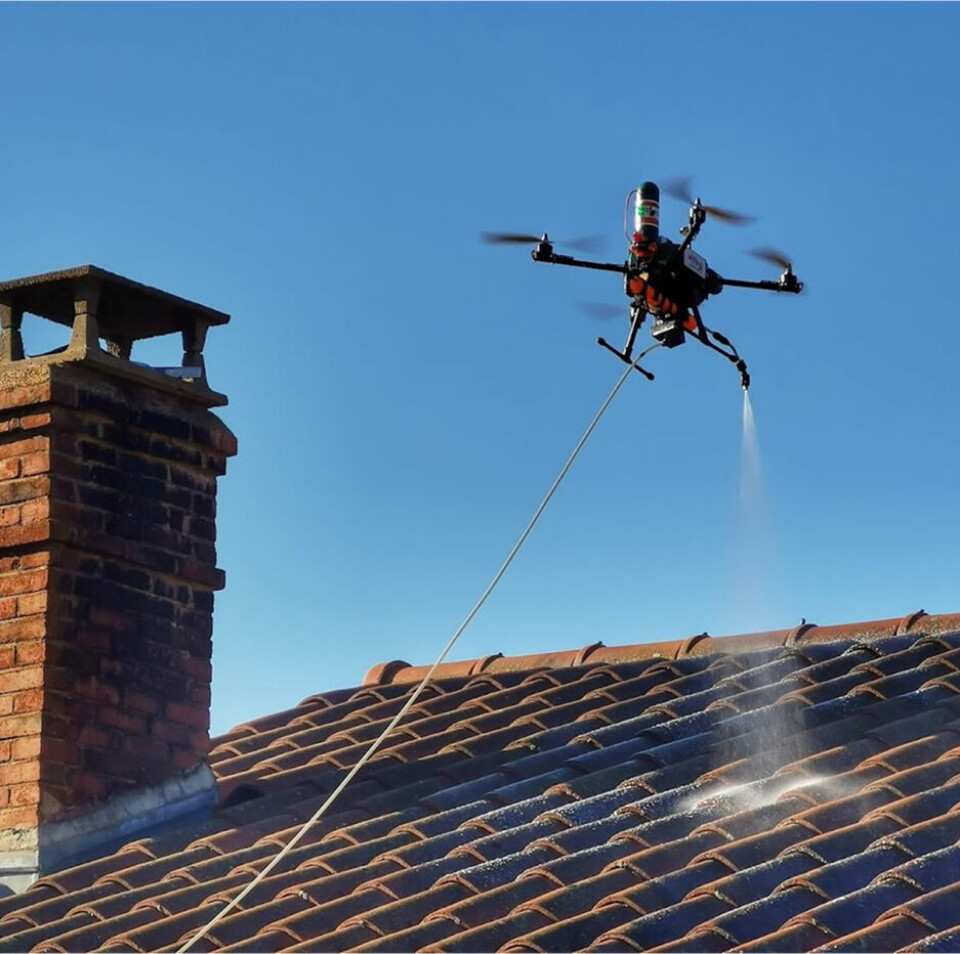-
Senator bids to ban new second homes in several areas - how would it work?
‘These areas are out of control’ says the deputy mayor of Paris in charge of housing who is supporting the idea
-
Letters: French roofers' tiling error made it rain in my home
Connexion reader shares a hard lesson on making sure your canal tiles are are correctly positioned
-
Product recalls in France: Drain cleaner and bottled water
Faulty caps and pesticide issues are cited as the causes
Drones can replace scaffolding to clean roof and walls of French homes
The small flying devices carry a hose and spray chemical onto mossy surfaces that are hard to reach

A British man living in France has found a novel use for drones – to clean moss and other unsightly stains from roofs and house walls.
James Richardson, based in Bergerac, Dordogne, was working as a sales rep for a British firm when he saw a TV report about drones.
“The penny just dropped, and I realised that it was something I could do,” he said.
“I needed a change and this was a way of getting out and setting up my own business.”
Training, licence and cost
As with many things in France, rules and regulations concerning drones are complicated, and piloting one over 900g requires a special licence.
The drones used by Mr Richardson weigh 5kg and carry a hosepipe linked to a pump and reservoir on the ground.
They are made by a company near Perpignan and cost between €10,000 and €30,000 each.
“I hadn’t even flown a model aircraft before, so the training started from scratch with small drones before I moved on to larger ones.”
The four-week training course, which took place at Bordeaux airport, cost €5,000.
Ukraine complication
The drone’s batteries typically last for 10 minutes of work before having to be changed, but for Mr Richardson that is enough.
“We work with GPS mapping and have a camera on the drone. You need to concentrate hard, especially when you are doing a roof where, because of the angles or things like chimneys, you cannot see the drone all the time.”
Since the war in Ukraine, an additional complication is that the drones, which use signals from both Russian and American GPS satellites, sometimes lose the Russian signal when they are switched off for military reasons.
“You have to be ready to take over full manual control at any time,” said Mr Richardson.
Scaffolding replacement
The business case for using drones to clean buildings is particularly strong if the only alternative is hiring scaffolding or a high-lift platform.
“I recently did a church where the quote for scaffolding alone was €60,000. Obviously, we could come in with a much better price,” he said.
“But many ordinary houses also need to have their roofs de-mossed. I used to get up there every five years or so, always breaking a tile or two, which had to be replaced. It is much easier to have someone else do it from the ground.”
Once sprayed, the chemicals used take around five months to be fully effective. They have been approved both by the French environment ministry and departmental architects who have to be consulted for work on historic monuments.
Unusual jobs
Jobs have included cleaning chateaux, sprucing up properties before they are sold, and even a public swimming pool renovation in Paris.
“That was intense, because you do not get any GPS at all inside, and space was tight, but it worked,” Mr Richardson said.
Things do not always go smoothly.
“On one job, I was suddenly confronted by an angry man in underpants who rushed outside accusing me of photographing his property.
“He would not be placated and called the gendarmes, who checked my licence and told him it was all fine.”
Related articles
Drone firm can scatter ashes in French countryside while family watch
Paris banned from using drones to police deconfinement
France's La Poste uses drone to deliver to Alps
























